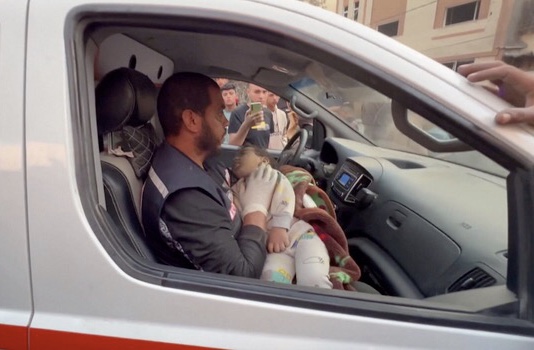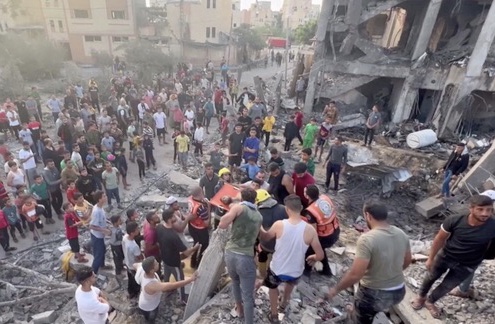Gaza has been subject to 10 days of Israeli aerial bombardment, and the latest death toll as at Tuesday 17th October in the Strip, is reported as having exceeded 2750 – many of whom are children and the elderly. Additionally, there are over 1 million Palestinians displaced from their homes. Omar Ghrieb, Oxfam’s Policy and Campaigns Officer for the Occupied Palestinian Territories, who is based in Gaza, described the current crisis in Gaza as ‘Nakba 2.0’.
Referring to the stories told by his grandparents, who had fled the Israeli invasion in 1948, he became aware that their nightmare, had become his own lived experience. In a recorded message placed on social media on Monday 16th October, as he fled from the North of Gaza in accordance with instructions received from the Israeli armed forces, he said:
‘Perhaps yesterday was one of the worst days of my life. We spent years hearing from our grandparents about Nakba and what that was and how they felt. And I think yesterday we had the chance to actually see it with our own eyes when we were all pushed into mass expulsion, to go from north and center Gaza into southern Gaza. And it was really horrible. People spent over 14 hours in an influx of a sea made of people, just walking with their belongings, holding children, holding sick people, holding people with disability, just walking and walking and walking under the sun, begging any passing car to take them, but most cars were full to the brim. It was Nakba 2.0 happening right in front of our eyes, and we are actually a part of it.’
‘Gaza is being strangled…The world right now has lost its humanity’
As a result of Israel’s blockade of the strip, the humanitarian situation in Gaza according to the UN is fast reaching catastrophic levels. Philippe Lazzarini, the Commissioner General of UNWRA, the principal UN Agency supporting the people of Gaza commented:
‘UNRWA operations are the largest United Nations footprint in the Gaza Strip, and we are on the verge of collapse,” he said, explaining that “not one drop of water, not one grain of wheat, not a litre of fuel” had been allowed into the Gaza Strip for the last eight days.’
He went on to describe a situation in Gaza in which he said:
‘In fact, Gaza is being strangled and it seems that the world right now has lost its humanity’
‘Old people, children, pregnant women, people with disabilities…deprived of their basic human dignity and this is a total disgrace’
Lazzarini pointed out that sanitary conditions across the South where hundreds of thousands had fled, had reached ‘appalling’ levels and he pleaded for the international community to press Israel to agree to a safe passage for relief supplies adding that:
‘Old people, children, pregnant women, people with disabilities are just being deprived of their basic human dignity, and this is a total disgrace!. The siege in Gaza, the way it is imposed, is nothing less than collective punishment’
Other NGO’s operating in the area including UK NGO, Medical Aid for Palestinians (MAP), described how hospitals and health clinics were experiencing dire shortages of emergency supplies – blood, essential medicines and surgical equipment.
Speaking on Democracy Now – the US Internet based TV news programme, Human Right’s Watch, Director of Israel and Palestine Affairs, Omar Shakir, was unequivocal about the seriousness of the situation in Gaza. He said:
‘We’re witnessing a situation that’s simply not fathomable for any of us on the outside. We’re talking about a population that has now for days been without electricity, that has been without water, that has been without — for large parts of it, without internet, that’s been without food, that’s been without aid. Hundreds of thousands have left northern Gaza. … They’re under constant bombardment. We’ve seen some of the more intense bombing of Gaza take place over the last 24 to 48 hours. There have been reports of people killed as they were taking a safe route out of Gaza. The hospitals are operating on generators, which are running out of fuel. People are now resorting to water that’s unfit for human consumption. There are people that have not been able to leave northern Gaza, because you have there Gaza’s main hospital. You have people with disabilities. You have older people. And they’re terrified of what might come ahead. You have Israeli officials who are signalling their intent to commit large-scale atrocities.’

The power outages due to lack of fuel, have ensured that the hospital generators are likely to soon be without capacity, placing thousands of patients such as those with acute kidney and cancer conditions at risk of death. Newly born children are also at risk as incubators are wholly reliant upon the dwindling power supplies.
Gaza Health Ministry warns of the death of thousands if the hospital stops working
The Gaza Health Ministry spokesperson, Ashraf al-Qidra, said:
‘If the hospital stops working, the whole world will be responsible for the lives of hundreds and thousands of patients who rely on our services, especially from Shifa’
The Secretary General of the United Nations, António Guterres, described the current situation in Gaza as being ‘on the verge of the abyss in the Middle-East’ He added:
‘Gaza is running out of water, electricity and other essential supplies. The United Nations has stocks available of food, water, non-food items, medical supplies and fuel, located in Egypt, Jordan, the West Bank and Israel. These goods can be dispatched within hours. To ensure delivery, our selfless staff on the ground, along with NGO partners, needs to be able to bring these supplies into and throughout Gaza safely, and without impediment to deliver to those in need.’
US Secretary of State to meet Israeli’s to discuss humanitarian corridor
Meanwhile the White House has announced that the US Secretary of State, Antony Blinken, plans to attend meetings with senior Israeli officials on Wednesday 18th October in Tel Aviv, which according to reports will discuss plans:
‘that will enable humanitarian aid from donor nations and multilateral organizations to reach civilians in Gaza’


















